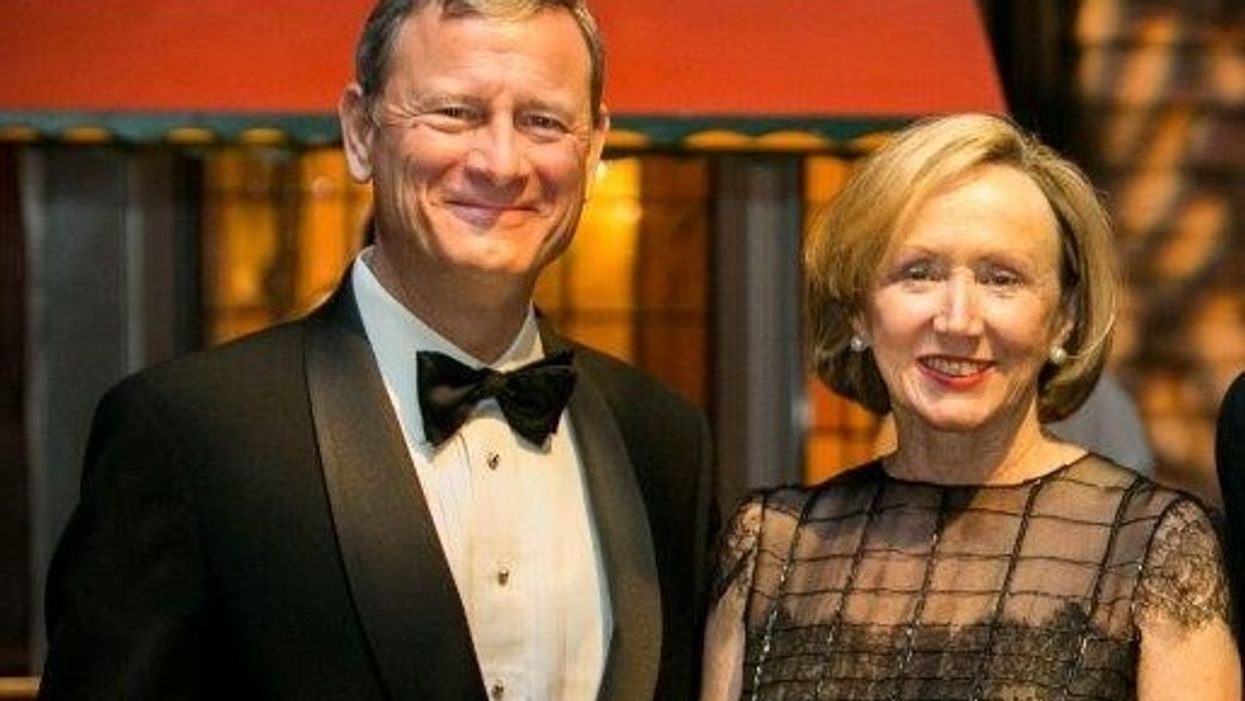
Chief Justice John Roberts and his wife Jane Sullivan Roberts
Liberals got a big victory on abortion rights last week thanks to Chief Justice John Roberts, but don't think they're not ungrateful. "John Roberts is not your friend," announced the left-leaning weekly The Nation. "No one should be fooled," huffed a New York Times editorial. "The current court is as hostile to reproductive freedom as it ever was."
He's not getting any love from conservatives, either. "He has sided with abortion extremists who care more about providing abortion-on-demand than protecting women's health," charged Sen. Ted Cruz (R-TX) This alleged shift makes a fool of Cruz, who endorsed Roberts' 2005 nomination, calling him "a principled conservative" who would continue "carefully, faithfully applying the Constitution and legal precedent."
Cruz was right: Roberts did apply precedent when it came time to consider a Louisiana law aimed at closing abortion clinics by requiring abortion doctors to have admitting privileges at nearby hospitals. The chief justice noted that the court had struck down a nearly identical Texas law in 2016 — over his dissent — and concluded he had to respect that precedent and strike down this law, too.
Abortion-rights supporters fear the ruling is just a brief respite before Roberts and his conservative colleagues proceed, slowly or quickly, to dismantle the court's landmark 1973 Roe v. Wade decision. They may be right. But his opinion in the Louisiana case suggests he may decline to join that project - and offers clues of how he would justify his refusal.
On Monday, Roberts highlighted the importance of following the court's past decisions, under the doctrine of stare decisis ("to stand by things decided"). "Respect for precedent 'promotes the evenhanded, predictable, and consistent development of legal principles, fosters reliance on judicial decisions, and contributes to the actual and perceived integrity of the judicial process,'" he wrote, quoting from a 1991 decision.
Justices are often fickle with precedents, using them when convenient and disregarding them when not. Roberts has been willing to overturn rulings in some major cases. Most notable was the Citizens United decision, which said corporations, labor unions and other independent groups can spend as much as they want in political campaigns. But in that case, the law he voted to overturn presented genuine conflicts with established constitutional rights.
The chief justice might conclude that despite his dim view of the court's abortion rights decisions, he is obligated to follow them. One reason is that the constitutional right enshrined in Roe v. Wade is now nearly half a century old. Two generations of women have grown up taking for granted that they may decide whether to carry a pregnancy to term.
The justices can't be frozen in the past, of course. Unforeseen developments sometimes force the court to revise its thinking about what the constitution allows and forbids. But that's not the case with abortion rights. Nothing fundamental has changed since 1973.
The court has also reaffirmed its central holding dozens of times. Appeals court Judge Michael Luttig concluded that the court intended one important 1992 decision as one of "super-stare decisis with respect to a woman's fundamental right to choose whether or not to proceed with a pregnancy." The court strove to close the door on the issue, lock it, bolt it, nail it shut, affix a "Do Not Enter" sign and throw away the key.
Overturning or sharply narrowing Roe wouldn't be a matter of discarding one or two precedents. As Harvard Law professor Charles Fried has noted, the court has invoked Roe in cases involving homosexual sodomy, assisted suicide, parental rights and more. A repudiation of the 1973 decision, he said during Roberts' confirmation hearing, "would be enormously disruptive."
There are sound conservative reasons that Roberts could cite in preserving the right to abortion. It is a longstanding freedom; the court has repeatedly affirmed it; and overturning it would unleash a storm of turmoil in both the personal realm and the legal one.
What he may fear is that it would also make the court look nakedly political. Not to mention that history would remember him mainly for his role in revoking the right to abortion.
"Adherence to precedent promotes evenhandedness, promotes fairness, promotes stability and predictability," said Roberts in his confirmation hearing. "And those are very important values in a legal system."
Stability. Predictability. He may not turn out to be the deciding vote to preserve abortion rights. But if he does, conservatives can't say he didn't warn them.
Steve Chapman blogs at http://www.chicagotribune.com/news/opinion/chapman. Follow him on Twitter @SteveChapman13 or at https://www.facebook.com/stevechapman13. To find out more about Steve Chapman and read features by other Creators Syndicate writers and cartoonists, visit the Creators Syndicate website at www.creators.com.
- Chief Justice Rebukes Schumer Over Threats To Gorsuch And ... ›
- Republicans Attack Supreme Court (And Roberts) After Week Of ... ›
- Despite Pro-Choice Ruling, Supreme Court Still Threatens Abortion ... ›
- Why Chief Justice Roberts May Fail To Protect The 2020 Election - National Memo ›
- What Abortion Opponents Should Do -- If They Actually Want To Support Women - National Memo ›
- With $1.6 Billion, Leonard Leo Will Bury Republicans In A Very Deep Hole - National Memo ›
- Right-Wing Career Women Tell Girls To Drop Aspirations -- And Marry Now (VIDEO) - National Memo ›
- Chief Justice's Opinion Is Another Racist Lie About Our 'Constitutional History' - National Memo ›
- Why Won't Media Report Basic Facts About Trump's Colorado Ballot Debacle? - National Memo ›
- When Senate Republicans Claim To Support IVF, They're Lying - National Memo ›








